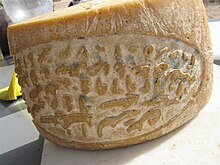Rumi cheese (Egyptian Arabic: جبنه رومى gebna Rumi [ɡebna rumi], also spelled roumi/roomi) is one of the main types of cheese in Egypt. Despite its name (Rūmī, literally, Roman), the cheese is Egyptian. Traces of it go back to the ancient Egyptians. It has a pungent smell, and different degrees of saltiness depending on the age.[1][2]
| Rumi | |
|---|---|
 | |
| Country of origin | Egypt |
| Pasteurized | No |
| Texture | Hard/Crumbly |
| Weight | 10kg disks |
Description
editRumi is thought to be derived from the Greek kefalotyri cheese, but the first known Rumi cheese was actually found in Saqqara and it’s believed to be known at least since 3200 BC.[2] It is the main hard cheese in Egypt.[3] It belongs to the same family as pecorino romano and manchego.[4] Rumi cheese is made from cows' milk, or from buffalo milk.[5] No starter culture is used.[6] The milk is natural, with full cream. Peppercorns may be added.[7] After 3–4 months the cheese develops an open texture and a sharp, pungent flavor.[8] Rumi is available in 10 kilograms (22 lb) disks or as slices with variable weight in vacuum packing.[7] There are 100 calories in an ounce serving, with about 28% saturated fat.[9]
Related products
editThe addition of low levels of PGE or lipases from R. miehei or R. pusillus has been reported to improve the flavor of [clarification needed] Domiati cheeses.[10] In 1985 an experimental cheese was made using equal amounts of cow and buffalo milk, with the addition or 20% to 30% of soy milk. The fat content was lower than natural cheese, and the flavor was affected slightly, but the result was said to have "satisfactory sensory properties".[11] Although the fermented cheese mish is traditionally made from Areesh cheese, commercial products similar to mish may be made from domiati cheeses.[12]
See also
editNotes
edit- ^ African Cheese: Egypt.
- ^ a b Staff, News (2018-08-16). "World's Oldest Solid Cheese Found in 3,200-Year-Old Jar in Egypt | Sci.News". Sci.News: Breaking Science News. Retrieved 2023-08-18.
{{cite web}}:|first=has generic name (help) - ^ Fox 1999, p. 431.
- ^ Fox et al. 2004, p. 11.
- ^ "الجبن الرومي.. ما سر الاسم في مصر؟". سكاي نيوز عربية (in Arabic). Retrieved 2023-07-06.
- ^ Tamime 2011, p. 143.
- ^ a b egyptian romy cheese: Agriculture source.
- ^ Fontecha et al. 1990, p. 310.
- ^ Egyptian Roomy Cheese...
- ^ Fox 2000, p. 355.
- ^ Shurtleff 2012, p. 237.
- ^ Fox et al. 2004, p. 240.
References
edit- "African Cheese: Egypt". iFood. 2012. Archived from the original on 4 June 2013. Retrieved 4 March 2013.
- "egyptian romy cheese". Agriculture source. 2012. Archived from the original on 15 February 2013. Retrieved 4 March 2013.
- "Egyptian Roomy Cheese calorie and nutritional information". myfitnesspal. 2012. Retrieved 4 March 2013.
- Fontecha, Javier; Amigo, Lourdes; Angel de la Fuente, Miguel; Juarez, Manuela; Ramos, Mercedes; El-Shikh, Mohamed; El-Shibiny, Safinaz (Oct–Nov 1990). "Ripening changes in Ras cheese prepared from ultrafiltered milk". Zeitschrift für Lebensmittel-Untersuchung und -Forschung. 191 (4–5): 310. doi:10.1007/bf01202433. S2CID 83430806.
- Fox, P. F. (1999-08-01). Cheese: Chemistry, Physics and Microbiology (Major Cheese Groups). Springer. p. 431. ISBN 978-0-8342-1339-5. Retrieved 2013-04-15.
- Fox, Patrick F. (2000-02-29). Fundamentals of Cheese Science. Springer. p. 355. ISBN 978-0-8342-1260-2. Retrieved 2013-04-15.
- Fox, Patrick F.; McSweeney, Paul L.H.; Cogan, Timothy M.; Guinee, Timothy P. (2004-08-04). Cheese: Chemistry, Physics and Microbiology: Major Cheese Groups. Academic Press. ISBN 978-0-08-050094-2. Retrieved 2013-04-14.
- Gunasekaran, Sundaram; Ak, M. Mehmet (2010-12-12). Cheese Rheology and Texture. CRC Press. p. 5. ISBN 978-1-4200-3194-2. Retrieved 2013-04-15.
- Shurtleff, William (2012). History of Soy Yogurt, Soy Acidophilus Milk and Other Cultured Soymilks (1918-2012). Soyinfo Center. p. 237. ISBN 978-1-928914-47-1. Retrieved 2013-04-15.
- Tamime, A. Y. (2011-05-03). "Cheese Flavours". Processed Cheese and Analogues. John Wiley & Sons. ISBN 978-1-4443-4183-6. Retrieved 2013-04-15.